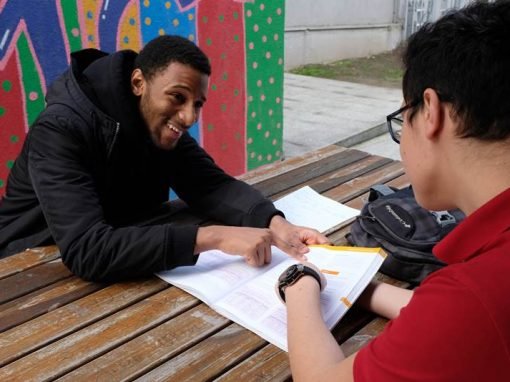Global Perspectives and Research (9239)
Cambridge International AS & A Level Global Perspectives and Research prepares learners for positive engagement with our rapidly changing world.
Learners broaden their outlook through the critical analysis of – and reflection on – issues of global significance. The Cambridge International AS & A Level Global Perspectives and Research syllabus is based on skills rather than on specific content. Learners develop research, thinking, reasoning and communication skills by following an approach to analysing and evaluating arguments and perspectives called the Critical Path. Collaborative skills are enhanced through participation in a team project. The skills gained through study of Cambridge International AS & A Level Global Perspectives and Research enable students to meet the demands of twenty-first century learning and to make a successful transition to study in higher education.
The national agency in the UK for the recognition and comparison of international qualifications and skills, UK NARIC, has reviewed Cambridge International AS & A Level Global Perspectives and found that it is comparable to UK A Level and develops skills that are particularly relevant in preparing students for higher education study internationally.
As part of the course, learners write a research report on a research question of their own choice.
We recommend students that register to this course, have an IGCSE certificate in First Language English with a minimum mark of C or an IGCSE certificate in English as a Second Language with a minimum mark of A. If registering students have completed a curriculum that is not Cambridge International in grades 9 and 10, they will be required to sit an entrance examination at our High School Campus.
Link to full Syllabus: https://www.cambridgeinternational.org/Images/414971-2020-2021-syllabus.pdf
Key Concepts
Cambridge International AS Level Global Perspectives & Research aims to encourage young people to think about and explore issues of global significance. Studying this syllabus will appeal to young people because it enables them to explore and make judgements about global issues of relevance and importance to their own lives. It offers learners opportunities to acquire, develop and apply skills in critical thinking, problem solving, research, communication and collaboration. In short, this course encourages the development within young people of global competency – the ability to define a global problem, reflect and take action.
This syllabus is firmly based on skills rather than specific content. Through the study of a range of global issues, learners will explore different and sometimes opposing perspectives. Recognising these perspectives will help to nurture a climate of cross-cultural awareness and promote cultural agility.
Cambridge International AS Level Global Perspectives & Research encourages transformative learning, whereby learners become more aware of their own beliefs and assumptions and more able to be self-critical. This leads to an increased willingness to modify their standpoints and be open to different views and ways of thinking. In short, this course will develop learners who are capable of understanding, assessing and taking action on global issues with competence and confidence.
By studying this course learners will develop research skills that will enable them to obtain information, evaluate its reliability and usefulness and use the evidence gathered to construct their own arguments and lines of reasoning.
Through well-defined stages, called the Critical Path, learners will be encouraged to apply a logical approach to thinking and reasoning. By following this path, they will be able to analyse the structure and context of arguments, assess the impact and limitations of evidence and make well-reasoned judgements. Learners will build skills in organising and communicating their findings in appropriate multimedia formats.
By developing thinking and reasoning skills, as well as research and communication skills, Cambridge International AS Level Global Perspectives & Research will enable learners to meet the demands of the twenty-first century and to make a successful transition to higher education, employment and lifelong learning.
Cambridge International A Level Global Perspectives & Research provides learners with the opportunity to further develop their research skills through the in-depth study of an academic topic of their own choice. Learners should be supported in identifying a suitable research topic, devising and developing an appropriate research question and engaging fully in the research process. As such this syllabus builds on the higher-order thinking skills of analysis, evaluation and synthesis but focuses primarily on developing learners’ research and communication skills.
Learners who have completed Cambridge International AS Level Global Perspectives & Research can therefore embark with confidence on the A Level syllabus, having already developed the skills involved in identifying questions, locating and evaluating sources and perspectives, and setting out a realistic and meaningful research agenda. The Critical Path provides learners with the skills and aptitudes to be successful in both AS and A Level Global Perspectives & Research.
Recognition and Progression
Every year thousands of students with Cambridge International AS & A Levels gain places at leading universities worldwide. Cambridge International AS & A Levels are accepted across 195 countries. They are valued by top universities around the world including those in the UK, US (including Ivy League universities), Europe, Australia, Canada and New Zealand.
UK NARIC, the national agency in the UK for the recognition and comparison of international qualifications and skills, has carried out an independent benchmarking study of Cambridge International AS & A Level and found it to be comparable to the standard of AS & A Level in the UK. This means students can be confident that their Cambridge International AS & A Level qualifications are accepted as equivalent, grade for grade, to UK AS & A Levels by leading universities worldwide.
Through constructing a research report, A Level learners are offered the opportunity to apply the tools for independent, proactive, interdisciplinary study. They may engage more deeply in a chosen specialism and may make a new departure with a study in a non-school subject, perhaps one that they plan to read at university. Learners are encouraged to cross academic boundaries with an interdisciplinary enquiry.
Cambridge International A Level Global Perspectives & Research encourages critical and creative thinking, with communication an important culminating feature of the process. By taking forward the emphasis on an interdisciplinary, independent and reflective approach, and by building on an awareness of the issues involved in setting up a research proposal, identifying an appropriate question, and undertaking a literature review or its equivalent, learners are well placed to make a successful transition to higher education, employment and lifelong learning.
Resources
The following are the preferred resources at Istanbul International School:
- Cambridge AS/A Level Global Perspectives and Research 9239 Coursebook
- Variety of resources determined by teacher
Cambridge International Examinations
AS Level Candidates take:
Component 1
Written Examination – 30% (1 hour 30 minutes)
Written examination consisting of compulsory, structured questions based on sources provided with the examination paper.
Candidates analyse and evaluate arguments, interrogate evidence and compare perspectives on global issues listed in the syllabus.
Externally assessed
Component 2
Essay – 35%
Candidates explore different perspectives on issues of global significance arising from their studies during the course and write an essay based on their research. The essay title is devised by candidates themselves.
The essay must be between 1750 and 2000 words and written in continuous prose.
Component 3
Team Project – 35%
Candidates work in teams to identify a local problem which has global relevance. Individual team members research the issue and suggest solutions to the problem based on their research findings. Teams work together to agree a set of proposed team solutions to the problem.
While the focus of the task is on team work, each candidate within a team prepares two pieces of work for individual submission. These are:
Presentation
Each candidate presents an eight-minute live presentation of their individual research and proposed solutions to the problem. Team presentations are not permitted.
Reflective Paper
Each candidate explains these team solutions in an individual 800-word reflective paper.
A Level candidates take:
Component 1
Written Examination – 15% (1 hour 30 minutes)
Written examination consisting of compulsory, structured questions based on sources provided with the examination paper.
Candidates analyse and evaluate arguments, interrogate evidence and compare perspectives on global issues listed in the syllabus.
Externally assessed
Component 3
Team Project – 17.5%
Candidates work in teams to identify a local problem which has global relevance. Individual team members research the issue and suggest solutions to the problem based on their research findings. Teams work together to agree a set of proposed team solutions to the problem.
While the focus of the task is on team work, each candidate within a team prepares two pieces of work for individual submission. These are:
Presentation
Each candidate presents an eight-minute live presentation of their individual research and proposed solutions to the problem. Team presentations are not permitted.
Reflective Paper
Each candidate explains these team solutions in an individual 800-word reflective paper.
Component 2
Essay – 17.5%
Candidates explore different perspectives on issues of global significance arising from their studies during the course and write an essay based on their research. The essay title is devised by candidates themselves.
The essay must be between 1750 and 2000 words and written in continuous prose.
Component 4
Cambridge Research Report – 50%
Candidates devise and develop a research question. This is answered in a report based on independent personal research.
The research report must not exceed 5000 words.
SUBJECTS














